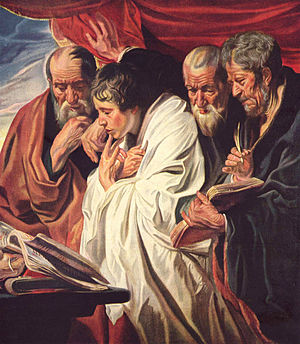 Image via Wikipedia Image via Wikipedia |
| The Four evangelists by Jakob Jordaens |
There were historic intervals when supporting or disseminating the Christian faith was dangerous, if not lethal. Reciting what the evangelists left behind as testaments was not always safe. The copies of the gospels, as they came to be known, were hidden, secreted, buried, lost, stolen, forgotten, left behind and discarded. As often happened in history, some hiding places were only discovered centuries after the caretaker of a scroll died.
The faithful spread the word, and the evangelists suffered for their diligence and zeal in getting the word out. Their followers, translators and transcribers did their best to further the dissemination of their important message. Despite - or because of - this zeal, mistakes were often made, and what we read in the scriptures today is in all probability quite different from the original writings the four testament writers took pains to put down for posterity. What we are left with is the subject of study, controversy and conjecture by scholars. Is it exactly what the evangelists wrote?
So many stories - myths and legends - grew around the origins of the gospels, who had written them, and the ways they were copied, translated and interpreted, that it was difficult to come upon one unifying decision. Conclusions and pronouncements were made by kings and popes, and some were contentious enough to incite great debate or outright wars.
When Jakob Jordaens painted the picture you see here, he might have done it with something other than devotion or reverence. The origins and motivations of the evangelists must have been on the artist's mind. Controversy surrounds the reason why this respected Flemish painter portrayed three old men and one rather young one. Who is the youngest one? Is it Luke? Was Jordaens privy to a secret about the identity of this evangelist? We must remember that according to historians, Luke never met Jesus, but did meet Mary. Did the Flemish artists of Jordaens's time know something disputable about Luke's identity that has remained a secret?
Find out in According to Luke, a novel that takes the secret controversy and blows it apart. As an author, I took on a lot of research, and found that a considerable number of Flemish artists portrayed Luke in an androgynous way - unbearded, smooth-skinned, and with eyes averted. Why did they do this? They must have shared some secret about the evangelist who traveled with Saint Paul and wrote the Acts of the Apostles. What did they know?
Read According to Luke and see how this exciting thriller gives a reasoned, researched solution to the question. See how Saint Luke's secret world was so dangerous that murder, extortion and mayhem were undertaken to keep it that way... secret.





Now that's a good tempter, Rosanne. I know nothing about Luke - except for the bits of the Bible we had to learn by heart at school - many of them. Thank goodness it was the King James version, with the beautiful language!
ReplyDeleteNothing is more beautiful than a lyrical work in which millions have found solace and food for thought. This is true not only of the gospels, but also immortal works by the great masters.
ReplyDeleteWell, having read your book, I am acquainted with the secret! I do wonder how much of what we think we know is totally wrong. Even what we see is open to question. How fresh the world must be to a baby, who has not yet learned to define objects.
ReplyDeleteMy knowledge of Luke comes from reading the bible, bible study, sermons and research. I have to disagree about errors in the bible as that discounts the power of God to overrule and inspire. Most perceived errors are not errors in fact as detailed study shows. All that said I did enjoy According to Luke as a piece of fiction and an interesting idea.It was cleverly handled and well realised.A review of it is here for anyone interested
ReplyDeletehttp://orangedale.livejournal.com/78882.html
Rosanne, that's one thing (among many) that I loved about your book; you bring "Luke" to life; the hidden painting becomes a person with hopes and desires, conviction and perseverence. We can only wish that (1) other ancient personalities might be revealed to us and (2) that we might know the truth about them.
ReplyDelete